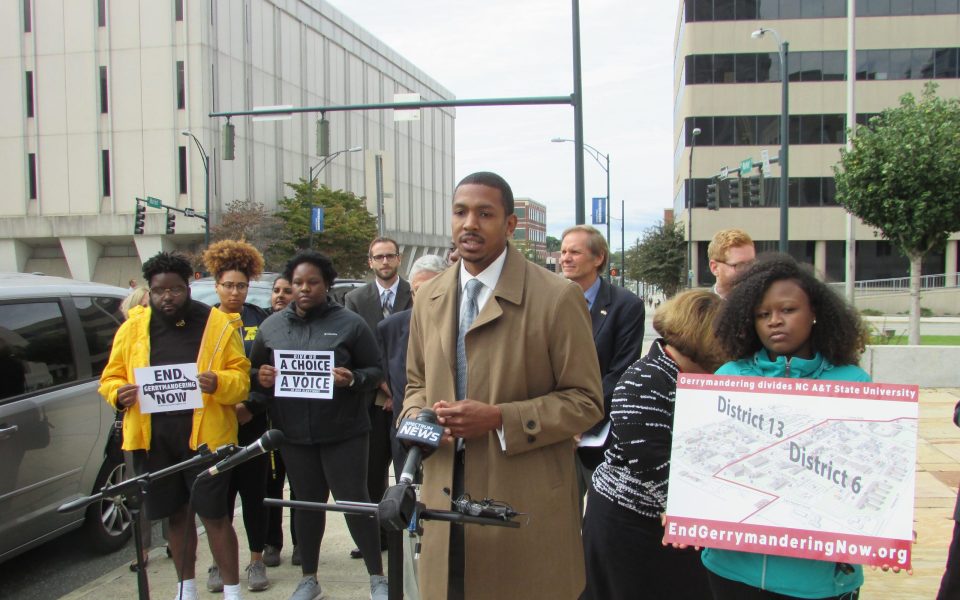Voters in High Point’s nonpartisan municipal election will choose between a black Democrat and a white moderate Republican for their next mayor. In Greensboro, a nail-biter election in the at-large bracket will likely determine whether a pro-development candidate or an advocate for the poor takes the third seat, and voters in the closely matched District 5 race will decide between a conservative Republican and a progressive Democrat.
There will be no such suspense in next year’s congressional elections. Assuming the current maps remain in place, the outcome is preordained. Ten out of North Carolina’s 13 seats will go to Republican candidates, and three will be allotted to Democrats even though the state is almost evenly divided — enough so to narrowly elect a Democratic governor last year. Reps. Ted Budd and Mark Walker, both Republican incumbents, are all but guaranteed to win reelection in their respective districts, which bisect Greensboro with a line straight through the middle of the campus of the state’s largest historically black university, in a county where registered Democrats hold a 75-percent advantage over Republicans.
There’s a reason why we get excited about city council elections, but we can write the script for the congressional race 12 months in advance. While the process of drawing electoral maps for Greensboro and High Point was by no means free of politics, the two governing bodies that approved the plans are nonpartisan and more closely reflect the voting base. In contrast, the congressional districts were drawn by the majority party in the state General Assembly, and overwhelmingly favor their own.
Rigging elections to disenfranchise roughly half of the population is wrong. Everyone knows it’s wrong. The only justification is the Republicans’ prerogative of maintaining their hold on power. The hyper-partisan gerrymandering scheme that effectively denies a voice in state government and the North Carolina congressional delegation to the Democratic majorities in urban counties like Guilford is dangerous for democracy. Extreme gerrymandering converts us from citizens to subjects, and when government loses legitimacy, democracy is in trouble. Of course, no amount of editorial scolding is going to persuade the Republican rulers to do the right thing. They well know that a press weakened by the digital revolution, erosion of advertising revenue and fragmented readership is ill equipped to hold them accountable.
The US Supreme Court is on the verge of making a seismic decision in Gill v. Whitford, described by Associate Justice Ruth Bader Ginsburg as “perhaps the most important” case of the 2017 term. As Ginsburg explained in a speech to law students in July: “So far, the court has held race-based gerrymanders unconstitutional, but has not found a manageable, reliable measure of fairness for determining whether a partisan gerrymander violates the Constitution.”
The three federal judges presiding over a case in Greensboro this week that involves a similar challenge to North Carolina’s congressional district map are no doubt awaiting the Supreme Court’s decision as guidance before they rule on whether the map violates the First and Fourteenth amendments.
Should the courts adopt the test proposed by plaintiffs in Gill v. Whitford, the case recently heard by the US Supreme Court, and League of Women Voters v. Rucho, the case under litigation in Greensboro, it would shake the republic to its foundations.
“Partisan gerrymandering is as old as America,” Jennifer Bremer of the League of Women Voters conceded during a press conference in Greensboro on Monday. “Patrick Henry drew the granddaddy of all gerrymanders to keep James Madison out of our very first Congress. Fortunately, he didn’t succeed. But if he’d had access to the mountains of data and powerful computer programs that drive today’s gerrymandering, it could well have been another story.”
An expert witness for the league randomly generated 3,000 Congressional maps using traditional redistricting criteria while excluding partisan considerations, and not one yielded a 10-3 Republican advantage. The typical map yielded seven Democratic seats and six Republican seats. The Republican mapmakers can choose their voters with such precision that the plaintiffs allege it would take a 9-point swing in a Democratic wave election to overcome the Republicans’ lock on power.
The cases raise a thorny constitutional question of whether judges should rein in the legislative branch. Lawyers for the North Carolina General Assembly conveyed an unmistakable message in their opening statement in Greensboro: Back off.
“If plaintiffs have their way, the federal courts will wander out of the political thicket and into a political lion’s den,” they said. “Plaintiffs’ theories do not — and cannot — answer the elusive question asked by the Supreme Court — how much politics is too much politics in redistricting? Instead, plaintiffs thrust federal courts into the middle of a vibrant and ongoing political conversation among competing views and ask judges to pick political winners and losers in what will become judicial gerrymandering.”
The defendants warn that the proposed fairness test “amounts to proportional representation,” adding that “no greater threat to the reputation of the federal judiciary exists than the lure of plaintiffs’ ‘social science’ sirens.”
Maybe, but “a vibrant and ongoing political conversation among competing views” hardly describes the current political climate in North Carolina. More like a monologue shouted through a bullhorn.
Join the First Amendment Society, a membership that goes directly to funding TCB‘s newsroom.
We believe that reporting can save the world.
The TCB First Amendment Society recognizes the vital role of a free, unfettered press with a bundling of local experiences designed to build community, and unique engagements with our newsroom that will help you understand, and shape, local journalism’s critical role in uplifting the people in our cities.
All revenue goes directly into the newsroom as reporters’ salaries and freelance commissions.


Leave a Reply